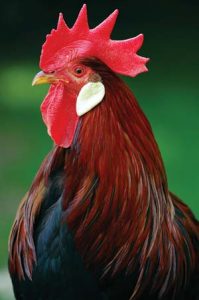Why do roosters crow in the morning? This rural resident’s morning ritual has little to do with time.
He is an icon of the morning. In most every rural scene he crows to greet the dawn. He crosses cultural and geographical boundaries as the harbinger of daylight. He says “Cock-a-doodle-do” in English, “Kikeriki” in German, “Kuklooku” in Urdu, and “Ko-ke-kok-ko-o” in Japanese. Biblical scenes center around his call, and he takes top billing in the folklore of countless cultures.
In Southeast Asia, the Hmong tell this tale: A long time ago, when the world was new, the sky held nine suns. The land was hot, the river dried up, and crops began to die. The people decided to ask their best archer to shoot the suns out of the sky. The next day, one by one, he shot the suns. Frightened, the last remaining sun hid behind a mountain where the archer could not reach her. Soon the people realized their mistake. The world grew cold, and the crops did not grow. The people spoke gently to the hiding sun to coax her back. They also asked animals and songbirds to try, but none could convince her to return. Finally, someone suggested the rooster, because he was fearless and would not give up. Agreeing to help, the rooster crowed three times, and the sun, believing she was safe, rose from behind the mountain. To show gratitude to the rooster, the sun placed a bit of the morning sky on top of his head.
But why is it that the rooster gets so excited about dawn’s rosy fingers? Does he take his job as the farm’s alarm clock too seriously? Does he just have something important to say?
Turns out the answer is simpler than you might think. First, roosters crow all the time. The connection with the sun coming up is a misconception. “They might, on occasion, crow right at dawn. But it’s just a coincidence,” Pete Alcorn says. “Roosters crow whenever they feel like it: morning, noon and night, not to mention afternoon, evening and the parts of the day that don’t have names.”

Roosters crow because they hear other roosters crowing, to show that a certain place in the barnyard is their turf, to try and assert their authority over another rooster, or even to gloat when a hen cackles after laying an egg. Joe Faust, the Accidental Farmer, says, “I think the general rule for this is that a rooster crows any time it wants to – or feels the need. For all I know, mine may crow on and off all night, but I just hear them in the morning.”
Why do roosters crow in the morning?
As a diurnal animal (one that is active during the day), the rooster starts his daily doings when the sun comes up. If you think about early morning, it’s almost always associated with bird song. Most birds seem to spend time shouting their messages to the world in the morning, and chickens are no different.
David Feldman quotes Janet Hinshaw of the Wilson Ornithological Society who says, “Most of the crowing takes place in the morning, as does most singing, because that is when the birds are most active, and most of the territorial advertising takes place then. Many of the other vocalizations heard throughout the day are for other types of communication, including flocking calls, which serve to keep members of a flock together and in touch if they are out of sight from one another.”
The reason that we associate a rooster’s crow with the dawn is most likely because that’s when it’s most noticeable to our sleepy selves. When the relative quiet of night is disturbed by the local rooster, we sit up, take notice, and maybe grumble a little on the way to the barn.
Despite childhood close encounters of a negative kind, Associate Editor Jenn Nemec is slowly learning to love poultry.








